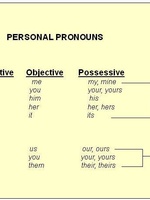
- 06.09.2018
- vlad.pruha.web
- 1
There are several types of sentences that cause confusion about whether to use a subject or object pronoun: sentences with a compound subject or object; sentences with a pronoun followed directly by a noun; and sentences that use pronouns after than or as. After this lesson, you'll be much more confident about which pronouns to use in these tricky situations.
Pronouns in Compounds
In sentences that use two pronouns or a noun and a pronoun together, it's easy to become confused about which pronoun to use. If you're not sure which one is correct, consider whether it's part of the subject (doing the action) or part of the object (either receiving the action or after a preposition). Sometimes a pronoun may sound right to you, but you can't always trust your ears. Be especially careful with I and me, which are two of the most common offenders.
Common Error #1: Using Object Pronouns in Place of Subject Pronouns
| Error | Correction |
|---|---|
| Jesse and | Jesse and I went to school. |
| He and I bought a new puppy last week. | |
| We took the bus. |
Notice how in the last example it would sound strange to say they and I, so the best solution is to combine the two pronouns into the single pronoun we.
Common Error #2: Using Subject Pronouns in Place of Object Pronouns
| Error | Correction |
|---|---|
| He met Jeremy and | He met Jeremy and me. |
| Nancy hit Will and | Nancy hit Will and me. |
| Is that hot fudge sundae for Carlos and | Is that hot fudge sundae for Carlos and me? |
| My brother sat right between you and | My brother sat right between you and me. |
The last two examples use object pronouns because they come after prepositions (for and between).
- Hint:
- To decide whether you need to use a subject pronoun or an object pronoun, cross out the other pronoun or noun, and use the pronoun that sounds correct when it stands alone.
Jesse andI went to school. (You would say I went, not me went.)
Nancy hityou andme. (You would say Nancy hit me, not Nancy hit I.)
Is that hot fudge sundae forCarlos andme? (You would say for me, not for I.)
Pronoun order can be another tricky topic when dealing with compounds. Writing convention suggests that, out of courtesy, when using the first person pronouns I or me, we generally put these pronouns last, allowing the other names and pronouns to go first.
Sam and I saw a movie on Saturday.
I wrote a story about my cat and me. (Not me and my cat.)
Pronouns Before Nouns
Sometimes for clarity or emphasis, writers use a pronoun and a noun together. People often use an object pronoun when they mean to use a subject pronoun, and vice versa.
| Error | Correction |
|---|---|
| We writers enjoy writing fiction. | |
| The teacher explained the lesson to | The teacher explained the lesson to us students. |
- Hint:
- To decide whether you are using the correct pronoun, ignore the noun and see whether the pronoun is correct on its own.
We
writersenjoy writing fiction. (Not Us enjoy writing fiction.)
The teacher explained the lesson to usstudents. (Not explained the lesson to we.)
Pronouns After Than or As
When sentences use than or as to compare, it can be difficult to choose the correct pronoun.
| Error | Correction |
|---|---|
| Diana is a better speller than | Diana is a better speller than I. |
| He knows a lot more than | He knows a lot more than she. |
| She plays basketball just as well as | She plays basketball just as well as I. |
| We grew as much as | We grew as much as they. |
At this point you might be wondering why the left column of this chart sounds correct while thinking that the right side sounds a little strange. That's because it's perfectly acceptable to talk that way in casual conversation. However, in formal writing you must follow the examples in the right column. (There are cases in which it's okay to use an object pronoun after than or as, but doing so completely changes the meaning of the sentence.)
- Hint:
- Ask yourself what is missing in the sentence. That will guide you in choosing the correct pronoun.
Diana is a better speller than I (am).
He knows a lot more than she (does).
She plays basketball just as well as I (do).
In sentences with than or as, different pronouns can create different meanings.
Imaginary monsters scare my little brothers more than (they scare) me.
(The monsters don't scare me as much as they scare my little brothers.)
Imaginary monsters scare my little brothers more than I (scare them).
(I don't scare my little brothers as much as the monsters do.)
She likes him as much as (she likes) me.
(She likes both him and me equally.)
She likes him as much as I (do).
(Both she and I like him the same amount.)
Reviews 1
- 27.02.2023 20:14Hello Dear,
How are you? I hope all is well,My name is elisabeth andrew,i saw your profile at(www.engvid.com) became interested in you for a friendship, I would like to know more about you.
Please contact me through my private email elisabethandrew@aol.com so i can give you my pictures for you to know who i am. I believe we can move from here, it will be a pleasure to know you sincerely!
Please I am waiting for your response!
